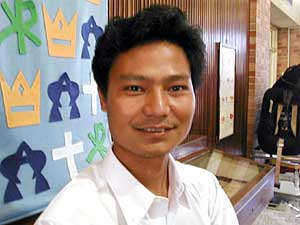|
Photos
Resources
Respond to this story
|
From war in Burma to peace in Minnesota
August 8, 2004
 |
| Burmese troops captured and tortured Eh Twa Dwe before he escaped Burma with his wife and daughters (MPR photo/Dan Olson) |
St. Paul, Minn. — Burmese troops entered his home village, Eh Taw Dwe remembers, and began rounding up village leaders and brought them to the church. "They tortured them in the church for three days, people were crying, they continuously were tortured," he says.
Eh Taw Dwe, 28, says when the Burmese troops captured him, one of the officers held a gun to his forehead threatening to pull the trigger.
"He pulled the trigger; the bullet was not there," he says.
 | |||
Eh Taw Dwe says along with the mock execution, Burmese troops beat him. Finally, they released him and he went home to his family, battered and bloody.
"They didn't realize it was me, you know, I was bleeding, you know, the whole of my face," he says.
Eh Taw Dwe says he convinced his wife who was three months pregnant the only way to save their lives and those of their two daughters was to escape. For 10 days they tramped through the Burmese jungle toward the border with Thailand enduring tropical heat, bad water and mosquitoes. His children became ill.
"My baby got diarrhea and the other one got malaria," he says.
 | |||
Eh Taw Dwe says he and his family reached the border exhausted. They saw Burmese border guards patrolling and feared they'd be arrested. He says he and his wife stepped back into the jungle, and he prayed for his family.
"(I prayed) don't let them die here and don't let me die here. Give me a way to get out of this country and get into Thailand, I will sacrifice my life, but not this baby.'"
Eh Taw Dwe and his family made it as did dozens of other Karen, many with similar escape stories. Every Sunday they gather for worship at First Baptist Church in St. Paul. Most Karen are Buddhist but many settling in Minnesota are Christian. They're arriving with little more than the clothes they wear. Several churches and many of the 300 Karen already living in Minnesota are helping them find food, clothing and a place to live.
Burma - the ruling military regime calls it Myanmar - is a Texas-sized country between India and China. The 10 million or so Karen living there are indigenous to the country. They trace their roots to Mongolia and arrived in what is now Burma 4000 years ago. The Karen comprise a little less than 1/4 Burma's population. Their language and culture are different from the majority Burmese.
Donna Guest, a Burmese specialist for London-based Amnesty International says the violent suppression of the Karen by the country's military rulers started years ago.
 | |||
"(There is )mass forced labor of Karen civilians who have to carry supplies for the Burmese army, they are ill treated, they are not fed properly. The Burmese military also forced them to work on land that is sometimes actually confiscated from the Karen themselves," she says.
Carl Nelson, a spokesman for World Relief, one of the private religious groups helping resettle Karen in Minnesota, says those caught trying to escape Burma are often sent back to home areas where they may suffer dire consequences.
"Some of them are killed, others are imprisoned, tortured," he says. "(If) they go back to situation they fled, villages have been burned, people have been killed, raped."
Many who escape live under cover in neighboring Thailand. The government there has welcomed millions of refugees - Karen, Hmong and others - from neighboring countries over the past two decades.
But Karen Leiter of Boston-based Physicians for Human Rights says the Thai government is experiencing what she calls 'compassion fatigue'. There's no guarantee, she says, the hundreds of thousands of Karen living and working there won't be arrested and returned to Burma.
Many Karen arriving in Minnesota go on welfare for a time. A few have been injured in the country's civil war and qualify for permanent disability benefits here. Most find work.
Saw Wilfred Tun Baw is chairman of the Karen Community of Minnesota. He's been here four years and works at a St. Paul nursing home.
"The job is a little bit difficult for me because of the communication because my English is still poor so it is very difficult for me, but we try because it is a freedom country," he says.
Saw Wilfred Tun Baw works at the nursing home from two in the afternoon until 10 at night. He spends the rest of his time helping newly arrived Karen refugees find clothing, food and a place to live as they start their new life in Minnesota.
|
News Headlines
|
Related Subjects
|
